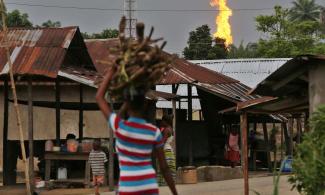
Delivering a presentation on the bill, Worika said the bill was written in isolation of agencies such as the Niger Delta Development Commission (NDDC), the National Oil Spill Detection and Response Agency (NOSDRA) and the Ministry of Niger Delta Affairs.

Lucky Worika, Dean Faculty of Law, University of Port Harcourt, says one of the potential drawbacks of the Petroleum Host and Impacted Community Bill (PHICB) is its seeming absence of inter-agency cooperation with other parastatals that deal with the Niger Delta. The proposed law, which is in the National Assembly, is still undergoing modification.
Delivering a presentation on the bill in Lagos on Wednesday, he said the bill was written in isolation of agencies such as the Niger Delta Development Commission (NDDC), the National Oil Spill Detection and Response Agency (NOSDRA) and the Ministry of Niger Delta Affairs.
According to Worika, the proposed structure of the law is the creation of a Petroleum Host and Impacted Community Development Trust. Therefore, any company that intends to operate in a community will set up a trust that will have a Board of Trustees, a management committee and a community advisory committee.
"A company with an Oil Prospecting Licence (OPL), the license that allows an oil firm explore a portion of land for petroleum, is expected to create its trust fund, before it submits its Field Development Plan," he said.
"A firm with an Oil Mining Lease (OML), the licence that allows a petroleum company drill an acreage for crude oil, is exposed to form its trust fund not less than 12 months after it begins operation. The one-year period extends to companies in the refining and retail arms of the industry. The fund will be sourced from 2.5 per cent of the oil company’s annual operating cost."
Worika disclosed that proposed alternate sources include a percentage of NDDC’s allocation, 3 per cent of the annual budget of the oil and gas sector and 50 per cent of the ecological fund provided for the Niger Delta state.
He also pointed out that the fund is classed into three portions: 70 per cent of the monies will be used for projects nominated by the company, 20 per cent will be set aside as a reserve fund for investment, the remaining 10 per cent will be a special project fund that is at the discretion of the trustees.
While giving some accolades to the National Assembly consultants who drafted the copy of the bill in circulation, Worika warned of the possibility of NDDC projects clashing with projects sponsored by the trust fund.